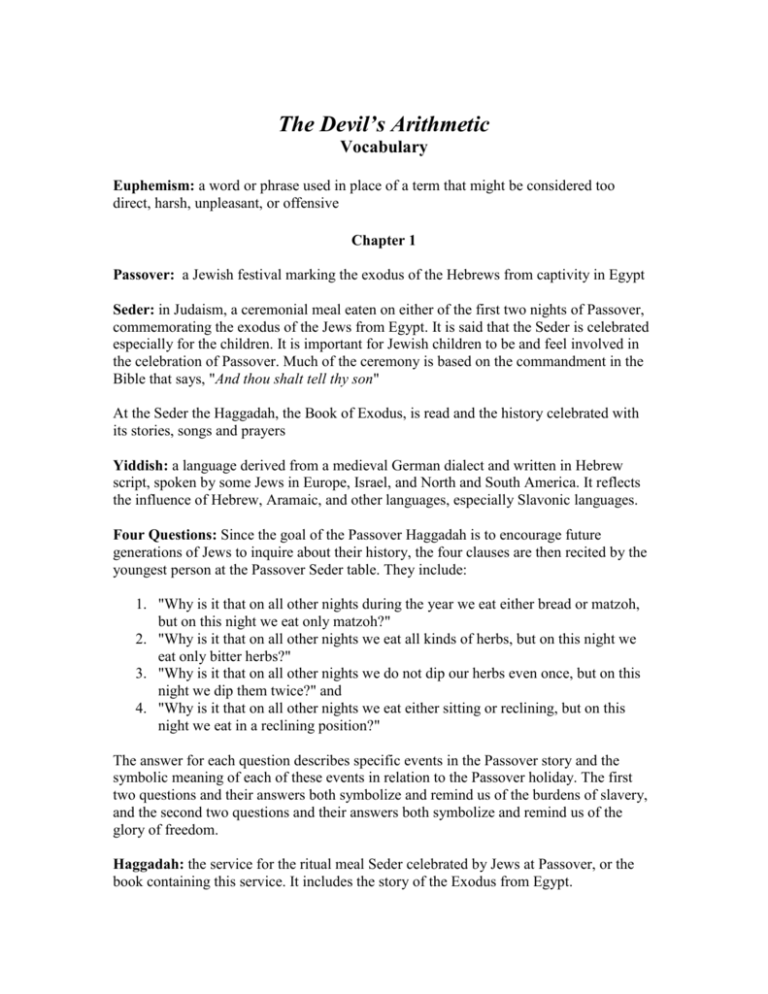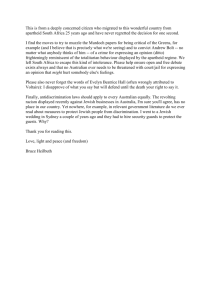TheDevilsArithmeticVocabulary
advertisement

The Devil’s Arithmetic Vocabulary Euphemism: a word or phrase used in place of a term that might be considered too direct, harsh, unpleasant, or offensive Chapter 1 Passover: a Jewish festival marking the exodus of the Hebrews from captivity in Egypt Seder: in Judaism, a ceremonial meal eaten on either of the first two nights of Passover, commemorating the exodus of the Jews from Egypt. It is said that the Seder is celebrated especially for the children. It is important for Jewish children to be and feel involved in the celebration of Passover. Much of the ceremony is based on the commandment in the Bible that says, "And thou shalt tell thy son" At the Seder the Haggadah, the Book of Exodus, is read and the history celebrated with its stories, songs and prayers Yiddish: a language derived from a medieval German dialect and written in Hebrew script, spoken by some Jews in Europe, Israel, and North and South America. It reflects the influence of Hebrew, Aramaic, and other languages, especially Slavonic languages. Four Questions: Since the goal of the Passover Haggadah is to encourage future generations of Jews to inquire about their history, the four clauses are then recited by the youngest person at the Passover Seder table. They include: 1. "Why is it that on all other nights during the year we eat either bread or matzoh, but on this night we eat only matzoh?" 2. "Why is it that on all other nights we eat all kinds of herbs, but on this night we eat only bitter herbs?" 3. "Why is it that on all other nights we do not dip our herbs even once, but on this night we dip them twice?" and 4. "Why is it that on all other nights we eat either sitting or reclining, but on this night we eat in a reclining position?" The answer for each question describes specific events in the Passover story and the symbolic meaning of each of these events in relation to the Passover holiday. The first two questions and their answers both symbolize and remind us of the burdens of slavery, and the second two questions and their answers both symbolize and remind us of the glory of freedom. Haggadah: the service for the ritual meal Seder celebrated by Jews at Passover, or the book containing this service. It includes the story of the Exodus from Egypt. Chapter 2 Bris: the religious circumcision ceremony for a Jewish boy Guttural: harsh Malach ha-mavis: Angel of Death Steerage: cheapest passenger rooms on a ship Yahrzeit: A memorial candle lit to honor the loved ones that have passed away Chapter 3 Chanukah: Another spelling of Hanukkah Yarmulke: a small round cap worn by Jewish men and boys Dayenu: traditional song sung during Passover Cloying: sickening Afikoman: ceremonial matzoh wrapped in fabric and hidden Droned: spoke with no inflection, boring Kosher: describes food that has been prepared so that it is fit and suitable under Jewish law Matzoh: unleavened (flat, without yeast) bread…like a cracker Guffawed: laughed loudly Chapter 4 Ornate: fancy Chelm: A small town in Poland which, according to Jewish folklore, was inhabited by foolish souls Sabbath: the Jewish holy day (Saturday) Shadchan: a matchmaker, a marriage broker for Jewish couples Shtetle: in former times, a small Jewish town or village in Eastern Europe Lublin: Lublin once served as one the most important centers of Jewish life, commerce, culture and scholarship in Europe. Conspiratorial: secretive Torah: the Jewish holy laws Viosk: a village in Poland Solemn: serious Chapter 5 Schnorrer: An offensive term for someone who is regarded as unduly dependent on other people, a lazy beggar Pilpul: Hebrew loosely meaning "sharp analysis" Yeshiva bocher: one who studies in a secondary school, college, for Jewish students with a curriculum including religious and cultural, as well as academic, studies Slovens: An offensive term that insults someone whose standards of personal hygiene and cleanliness are too low Chapter 6 Bar Mitzvah: the ritual ceremony that marks the 13th birthday of a Jewish boy, after which he takes full responsibility for his moral and spiritual conduct Cossack: Russian soldier Schmatte: a rag or worthless thing Plaits: braids Shul: synagogue Rendar: person in charge of a Jewish city Goy: An offensive term for someone who is not Jewish Mishigaas: craziness Yeshiva: a secondary school…college (see ch. 5) Tante: aunt Chapter 7 Klezmer: a traditional Jewish mobile band Badchan: entertainer/fortune teller Chapter 8 Sherele: a traditional Jewish wedding song Dour: unfriendly, sullen Undecipherable: impossible to understand Chapter 9 Plaintive: expressing sadness or sounding sad Canopy: a traditional feature in Jewish weddings that symbolizes the couple's first home together. Adamantly: very determined and not influenced by appeals to reconsider a position or decision Lilith’s Bridegroom : Lilith is a nocturnal female demon originating in Babylonian tradition, said to harm male children. Lilith’s bridegroom is Satan. Resettlement: to provide a group or population with a new place to live and transfer it there Assent: a formal expression of agreement or acceptance Billeted: assigned Desecrate: destroy Crematoria: building where corpses are burned Chapter 10 Periphery: boundaries Protruding: sticking out Tremulous: showing fear or nervousness about something Bissell: a little, slightly Shikse: non-Jewish girl Shabbos goy: A non-Jew who does work on Sabbath that a Jew cannot do Impudent: disrespectful Chapter 11 ‘Ruas, ‘Ruas, schneller: Out, Out, Faster Boruch deyen emes…: Blessed is the True Judge Embankment: slope Barracks: military housing Schnell: Fast Rucked: gathered Runnels: small streams Uninflected: monotone Zugangi: newcomers Stark: plain, lack of any ornament Baffled: confused Vehemence: force, intensity Amphitheater: rows of seats around an open space Mikvah: among Orthodox Jews, a ritual bath for cleansing or purification Achtung: Attention! Prominent: noticeable Shorn: having had something removed or taken away Discernible: obvious Chapter 12 Unadorned: plain Dank: foul Rummaged: sorted Crooning: singing Privies: bathrooms Affirmation: positive statement of achievement Rote: memorized Ingrate: somebody who shows or feels no gratitude Dissipating: fading away Chapter 13 Bellowing: loud, deep noise Arbitrary: random Fervor: intensity, passion Elusive: hard to hold Preamble: words leading up to Quartet of Swallows: 4 small songbirds Fatherland: is the nation of one's "fathers", in this case Germany Drone: low humming sound, or a boring voice Raucous: wild Chapter 14 Sonderkommando: were work units of Nazi death camp prisoners who aided with the killing process and burning of the bodies during The Holocaust Choosing: euphemism for picking those who would be killed Musselman: those who had given up Lilith’s Cave: the crematorium Processing: euphemism for cremation and burning of the bodies Organize: euphemism for to take or steal Valises: small suitcases Midden: garbage dump Sanctuary: safe place Cholera: an acute and often fatal intestinal disease Chapter 15 Blokova: prisoner in charge of newcomers Burnished: polished Cauldron: large cooking pot Gaudy: tacky, garish Luminous: shining brightly Ominously: threatening, suggesting or indicating that something bad is going to happen or be revealed Pervasive: spread throughout Sonorous: rich in sound Drek: trash Kaddish: prayer for the dead Chapter 16 Shucked: removed Gottenyu: Dear God! (an expression of shock or horror) Chapters 17 Portents: signs Staccato (p.148): Abrupt break in sound Ribino shel-oylam (p.148): the central prayer in the Jewish religion said to announce one’s willingness to forgive. Chapter 18 Shema Yisrael, Adonai Eloheynu… One of the most important prayers in the Jewish religion. It is said twice a day. It is also said when death is imminent. Volley: rounds of gunfire Kommandos : A slave laborer in the concentration camp. This particular duty was to carry off the dead bodies. This was Wolfe’s job Parody: mocking Superimposed: placed on top of Liebchen: sweetheart Babushka: kerchief tied under the neck Chapter 19 L’Chaim: a Yiddish toast, To Life! Epilogue: Partisans: civilians who fight the enemy








